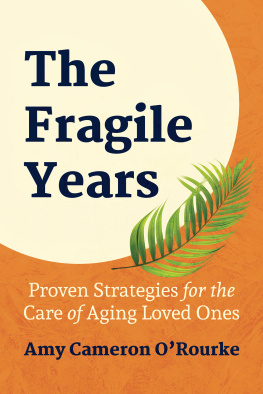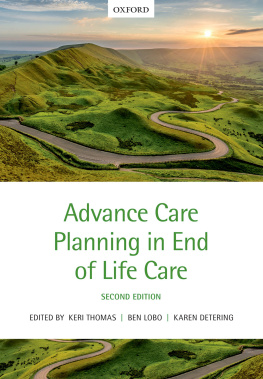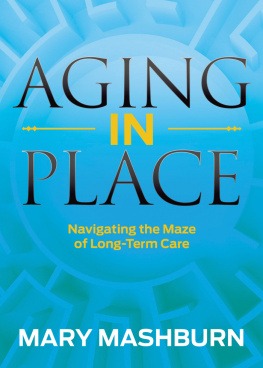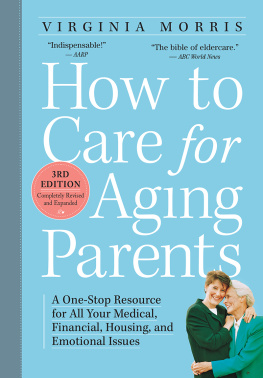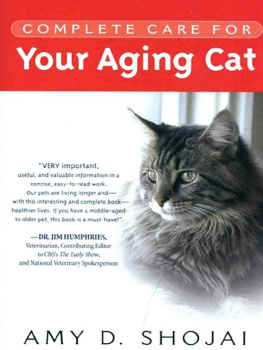Acknowledgments
So many wonderful people made this project possible and have supported me through the years of research and writing. I am told the acknowledgments cannot be longer than the book itself, so here I will name but a few of the generous souls who have made this experience so very rich. To the friends, the funders, and the winds of fate that helped bring this work to fruitionI thank you so.
Deepest thanks go to my friend and mentor Linchong Pothiban, of Chiang Mai Universitys Faculty of Nursing. She set this project on its course and nurtured me and my family every step of the way. Immense gratitude also goes to Sawang Kaewkantha, who was a constant guide and ally, and who opened up the world of elder care in Thailand to me.
I use pseudonyms for most of the people who appear in this book, though I am deeply grateful for their every assistance, great and small. Words in fact cannot express the gratitude I feel for everyone who allowed me to occupy the strange role of anthropologist and to live and work in their midst. Particular thanks goes to my family in Nong Hoi.
The research and writing represented here was made possible by generous grant support. My thanks go to the Social Science Research Council, the Wenner-Gren Foundation, the Harvard Committee on General Scholarships, the Mellon Foundation, and the Templeton Foundation.
Thanks unending to Mary-Jo DelVecchio Good, my mentor since college, without whom none of this would have been possible; Byron Good, an intellectual interlocutor beyond compare; Arthur Kleinman, an incredibly generous teacher, reader, and guide; Michael Herzfeld, an ally with great taste and superb attention to detail; and Michael Puett, whose enthusiasm and insight have proven inspirational at every turn. Michael M. J. Fischer has shown me what masterful scholarship looks like, and I thank him for his feedback on this project. Charles Hallisey remains a steadfast guide. Thank you to Paul Farmer, Anne Becker, Salmaan Keshavjee, and Arthur Kleinman, and the entire crew of Societies of the World 25, who taught me an enormous amount about global health practice and pedagogy, greatly influencing my thinking. Thank you to all my teachers, including the late Stanley J. Tambiah, who was a good friend and through whom I came to appreciate the power of history and the disorienting strength of radical egalitarianism. And above all, thank you to Aba Cecile McHardy, the Friendly Dragon, a guide in life and scholarship to whom I remain devoted across lifetimes; her influence can be marked on every page.
In Thailand, countless friends have guided my way and my understanding. A particularly warm thanks goes to Tana Nilchaikovit, from whom I have learned so much on so many levels. Deep appreciation, too, to Komatra Chuengsatiansup, a great mentor at home and abroad. Thank you to those working tirelessly with and for older people: Ajarn Aphassree Cheikuna, Phannaphat Mam Phophaenna, Janevit Wisojsongkram, Saranyu Win Kaewkantha, PA, PJeu, Sirinat Sonia Kasikam, Nong X, Sirinapa O-way, Nong Eunjai, Usa Khierwrord, and Somporn Nok Kiokaew. Additional thanks to Nong Way for her assistance, along with Sukyunya Pornsopakul, Duen Heang, and the incomparable Sangwan Poo Palee. Thanks go to the palliative care experts who taught me so much, including Veeramonl Chantaradee, Dr. Issarang Nuchprayoon, Wasinee Wisesrith, and Dr. Mano Laohavanich. Special thanks to the palliative care team at the Songklanagarind Hospital, Prince Songkla University, in Hat Yai, including Temsak Phungrassami, Sakon Singha, PFong, and PYae. Thanks also to everyone at the Phuthik Network, including Phra Paisal Wisalo and Sui Wanna Jarusombun. Thanks to Win Pop Mektri and to everyone at the Volunteer Spirit Network for generous access to the library. And my gratitude to the incredible scholars, policymakers, and practitioners for their time, work, and generosity, including John Knodel, Wipada Kunaviktikul, Wichit Sisopan, Siriphan Sasat, Bprasaan Tangchai, Tanet Wongyanawa, Naret Songkrawsook, Khwanchai Visithanon, Virapun Wirojratana, Samrit Srithamrongsawat, Suriya Wongkongkrathep, Weerasak Muangpaisan, PKaek, and Usamard Siampukdee.
A lifetime of gratitude to all my amazing colleagues in the Pioneer Valley for their support and inspiration in growing this work, including (but not at all limited to) Sonya Atalay, Elif Babl, Whitney Battle-Baptiste, Sue Darlington, Chris Dole, Deborah Gewertz, Alan Goodman, Suzanne Gottschang, Jennifer Hamilton, Krista Harper, Maria Heim (a game changer), Julie Hemment, Betsy Krause, Tom Leatherman, Lynne Morgan, Joshua Roth, Andy Rotman, Sahar Sadjadi, Boone Shear, Pam Stone, and Jackie Urla. Thank you to the Five Colleges and everyone in Culture, Health, and Science. And thank you Jen Sandler for critical relationality, and for guiding me to others naming and practicing transformative change.
My gratitude to Tanya Luhrmann for including me in the Mind and Spirit Project, which gave final direction to this work, and to the crew: Josh Brahinsky, John Dulin, Emily Ng, Rachel Smith, plus Kara Weisman, Vivian Dzokoto, and Nikki Ross-Zehnder. Hard to single out, but, Josh, thank you for the structuring commutes; and Emily, thank you for reading and naming and g-chatting through it all.
Thank you and continued loyalty to the original Thai writing group: Eli Elinoff, Malavika Reddy, Claudio Sopranzetti, and Benjamin Tausig. Claudio, you made it all possibleas friend and brother, we delight in and count on knowing you in the world. Lisa Stevenson, thank you for everything, for getting and supporting it all. And heartfelt thanks to other colleagues, friends, teachers, and family (and all combinations thereof) for their immense instrumental support, great insight, and good humor: Adisorn Juntrasook, Addy and Nick Grossman, Adia Benton, Akiko Mori, Andrew Johnson, Anna Corwin, Aroon Puritat, Barbara Barry, Bob Bickner, all the wonderful Thai teachers and my fellow students in Madison, Bonnie Brereton, Brooke Schedneck, Carey Clouse, Charlie Carstens, Chuck and Molly, Diarra Lamar, Donald Swearer, Eduardo Kohn, Elana Buch, Emiko Ohnuki, Erick White, everyone at the land foundation, Gernot Huber, Jamie Burford, Jason Danely, Jeffrey Samuels, Jeremy Smith, Jo Cook, Joe Harris, Julia Cassaniti, Kristina Lyons, Kurt Wise, Larry Ashmun, Kate Mason, Margaret Wiener, Marilyn Goodrich, Marisa Guptarak, Matt Yoxall, Mau Daw, Milena Marchesi, Mook MS, Mui Cheewintha Boon-Long, Nick Thomson, Non Arkaraprasertkul, Oriana Walker, Peggy Aulino, Pote Videt, Rachel Broudy, Raeann LeBlanc, Rebecca Hall, Roseanne Carrara, Saipin Suputtamongkol, Scott Stonington (a gem in the world, partner in this work), Shika Card, Smita Lahiri, Toby Lee, Tom Blair, Tom Borchart, Vicky Koski-Karell, Wirun Limsawart, Yoko Hayami, and Yuyang Mei. I could write pages on each and every one of you; such warmth to you all! Anitra Grisales, thank you for taking me on and providing insight and a formidably edited path to follow. And thanks, too, to Jim Lance, peer reviewers, and everyone at Cornell University Press for supporting this bookthrilling beyond belief.
I learned a lot about caregivingits mixtures of sacrifice and devotion and love and simply showing upperhaps most vividly in my own home. My mom spent eleven hours a day with us, caring for baby Ren her first year as I wrote the first iteration of this book, and my dad endured so much time alone to let her go. In the years since, they have done all the more, from the daily for baby Eamonn to reading these words and cheering me on. And sweetest Kevin Moore, a second dedication to you and the kiddos too for making this with me, wondrously turning all trials and travails into adventures. I love you.


